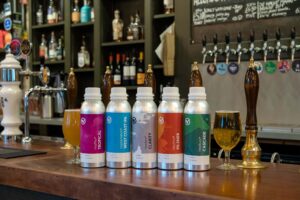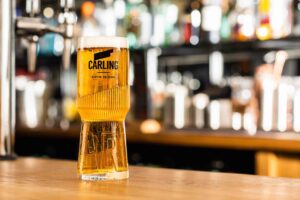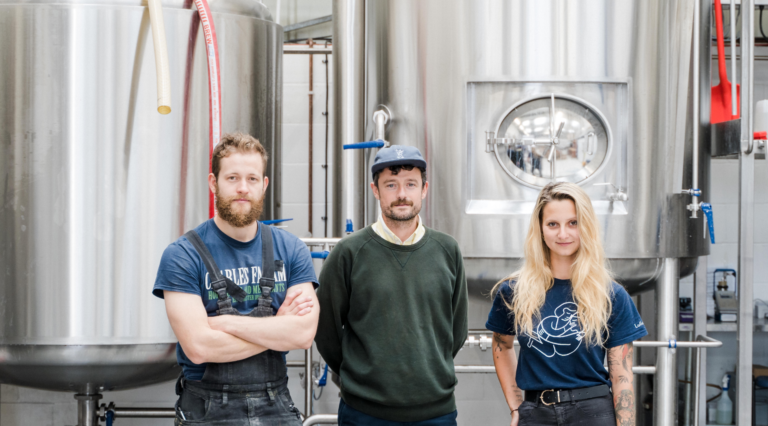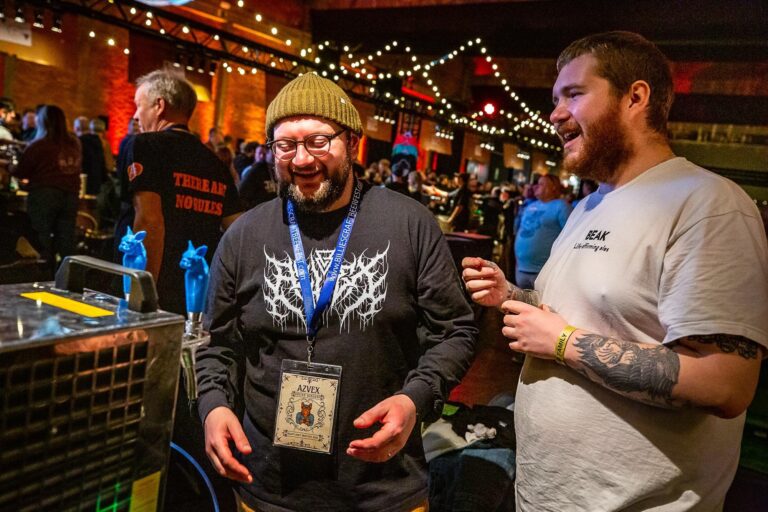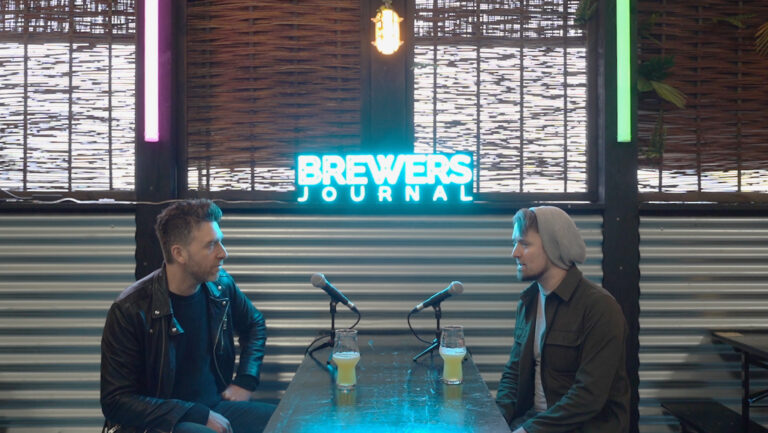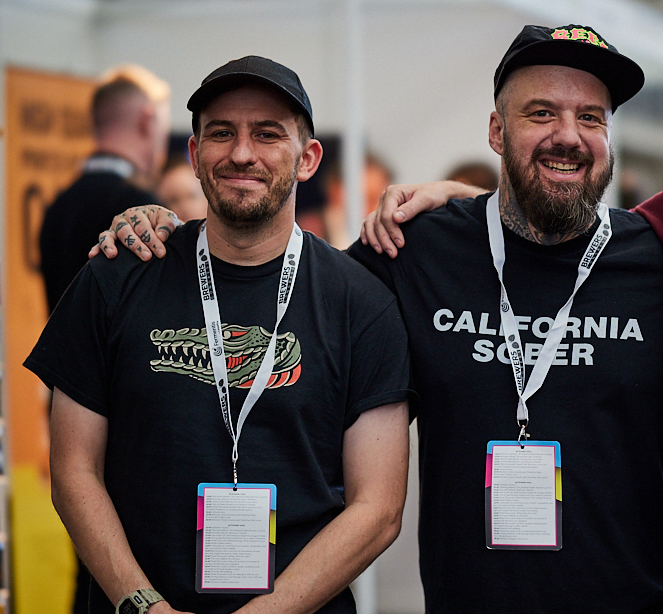If you’ve enjoyed a beer from the UK modern brewing industry, then there’s a good chance you’ve enjoyed a beer created, or collaborated on, by Colin Stronge. We speak to Stronge, the head brewer at Salt Beer Factory, to discuss how the business has overcome the challenges of the last 12 months, why breweries should be doing more to improve their QC and look back at some of the seminal beers he’s helped brew.
To make a mark in your field of expertise once is a sign of hard work and, perhaps, good fortune. To do that regularly shows there’s more at play than a bit of luck.
Whether you’re in sports, a musician or maybe a director, to hit the mark time and time again shows that you’re a professional and a master of your art.
Not only that, but there’s likely to be a grateful audience out there that appreciates and enjoys your work.
For a great brewer this dialogue is no different, and for the longest time, brilliant brewers have loathed the term “rock star” brewer.
And who can blame them? You can guarantee Colin Stronge, would be the first to shun such a title.
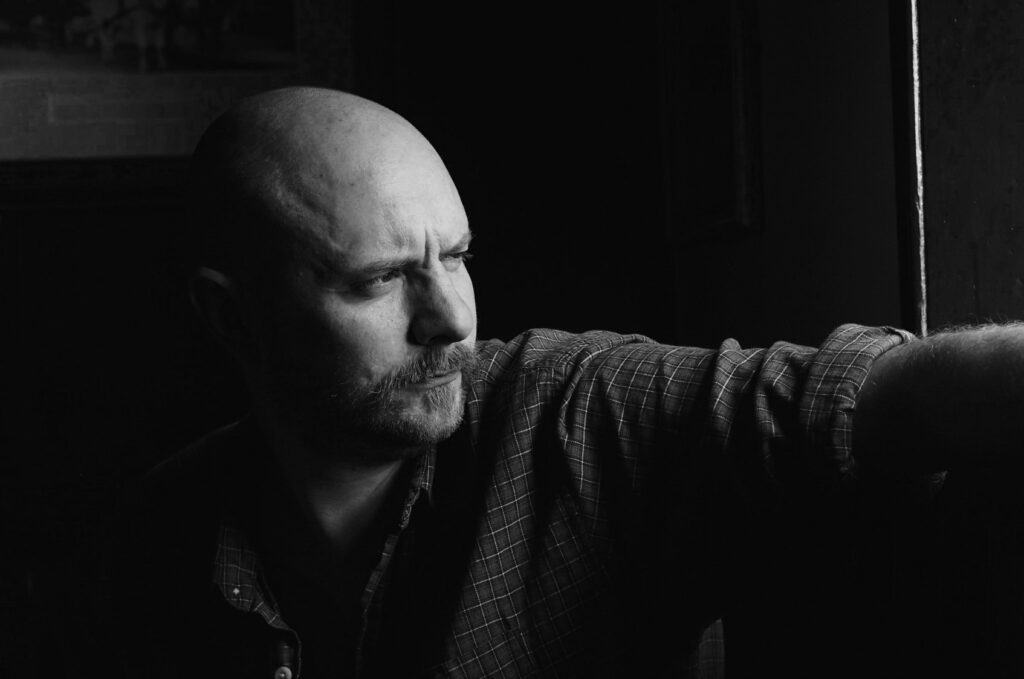
But there’s no denying the absolute quality of the beers Stronge has produced in his career to date.Not bad for someone who, in how own words, fell into brewing by accident.
To anyone that knows even a little bit about the modern beer scene, breweries such as Buxton, Black Isle, Marble and Northern Monk are synonymous with well-made, quality beers.
But you can also add Salt Beer Factory to that list, too. Founded in 2018, they’re a little newer than some of the names we’ve just mentioned.
However, for a business that opened following three years planning, the same level of care and attention that went into the brewery build, is evident in the beers they produce, too.
Thanks, in no small part, to head brewer Stronge. Following a career that has taken in those earlier breweries, Colin is now showcasing his wealth of expertise at Shipley’s own Salt Beer Factory.
Joining the business at the start of 2019, Stronge had a good year under his belt before, like so many others, he and the business had to adjust to everything 2020 threw at them.
“It was crazy,” he recalls. “We had some staff on furlough because we weren’t entirely sure how much work there was going to be. Along with that, my wife and I went through some odd working patterns so we could look after our child so that was all pretty exhausting!”
During the four days a week he spent in the brewery, Stronge would find himself double brewing most days with one spent transferring beer to Ossett Brewery (Salt’s parent brewery) for canning.
“We were turning out a fair amount of beer,” he says.
With hospitality shuttered for much of the last year, the team’s approach to brewing in lockdown would, in part, be informed by the brewery’s other sales channels, which includes bottle shops and supermarkets.
“With Ossett running 26 pubs, you had the best part of 400 people on furlough. We ended up being the only part of the brewery really bringing any money into the business,” Stronge explains. “So the pressure was on to keep the cash flow coming in. Thankfully beers such as Ikat, our DDH Double IPA, really took off in Tesco. That was a real help.”
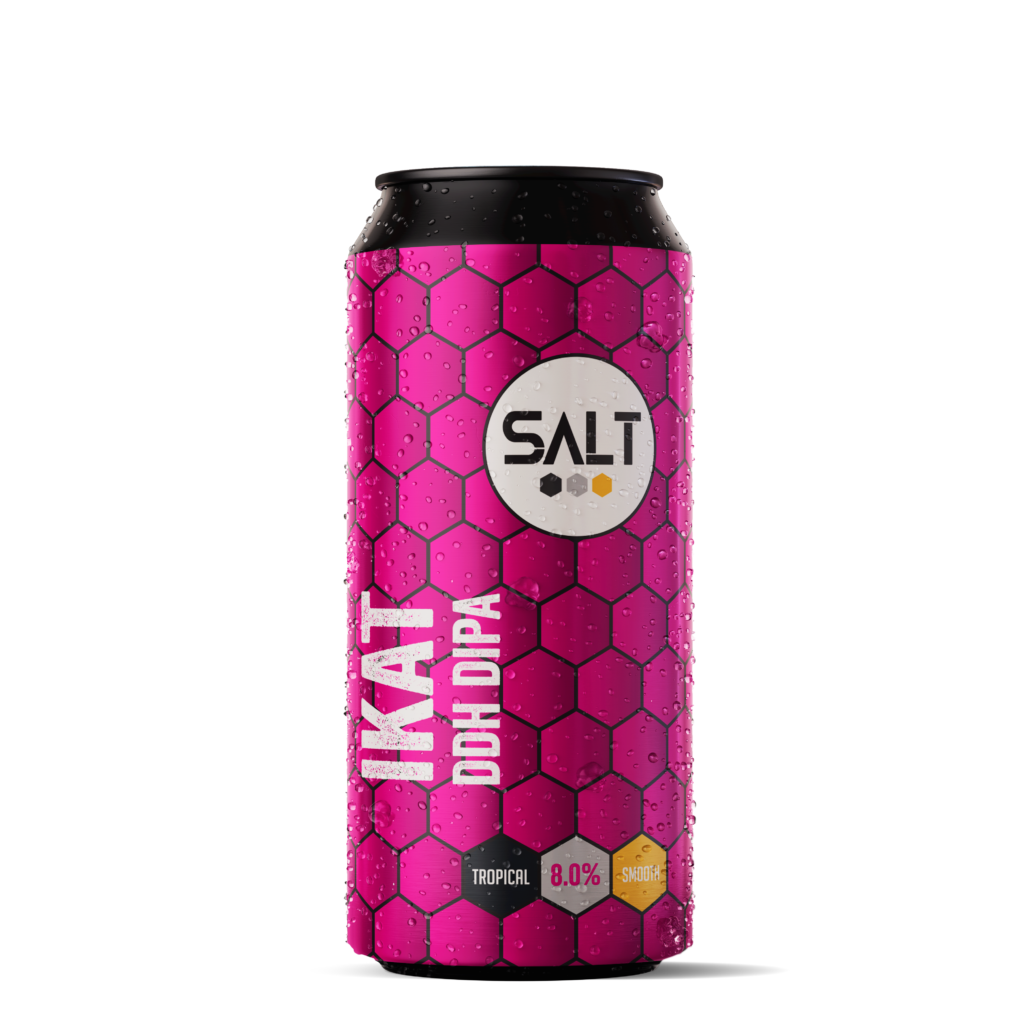
Stronge would find himself brewing Ikat on a regular basis, alongside beers such as its Citra NEIPA Jnr and Huckaback NEIPA in order to fulfil demand while also allowing him to crop yeast from.
As they got into their groove, Salt would utilise rare free tank time to brew some of its Vermont Session series of IPAs, each showcasing different hop varieties. These beers would resonate with consumers and enabled Stronge to exhibit his abilities in the world of hop-forward, hazy Pales and IPAs. But after half a year making these type of beers non-stop, how can we put it, he was ready for a change.
“I remember speaking with our MD Ned (Nadir Zairi) and telling him I’m just so sick of making IPA!” He laughs. “Yes I know it’s July, but let’s make a stout or something.”
The team dutifully obliged and as the colder nights drew in, they’d bring back a member of the brew team from furlough and resume making wealth of different beer styles to complement the hop-forward output that was serving the brewery so well during a challenging 2020.
“I’m a brewer so being able to explore is a real passion of mine. It really was a delight to be able to get back brewing different beers,” he says.
And beers from Salt Beer Factory have garnered an ever-growing fan base thanks, in part, to their presence on supermarket shelves. For Stronge, the ability to supply these channels has been an invaluable route to market for Salt in the last 12 months, be he’s also clear on the key role independent businesses play at the brewery, too.
“The reaction from some quarters to selling your beer in supermarkets is definitely less harsh than it was three or four years ago,” he recalls. “We had discussions in-house before we started selling our beer in Tesco, namely around the pros and cons of it all.
“But I do think there is less of a stigma surrounding it these days. It’s a viable route to market for breweries that want to leverage those channels. Look at the US, for many breweries their idea of success is being listed in these huge nationwide chains.”
“If the industry wants to continue to expand and continue to grow, then we can’t just be selling to the ‘bubble’”
For Stronge, it’s imperative that breweries do what is best for them and their goals as a company.
“If the industry wants to continue to expand and continue to grow, then we can’t just be selling to the ‘bubble’. We need to be selling to new customers,” he says. “I’m a passionate supporter of independent businesses, but what supports those independent businesses is getting people who buy mainstream brands into something different and introducing them to this space. We need to drag them over to the independents and you can’t be doing that by sheer will alone.”
Stronge adds: “I think there’s a viewpoint in the craft beer bubble where people would prefer it if all of their favourite breweries just appeared on the scene at five to 15 barrels and never grew beyond that.
“But unfortunately that does not keep the brewery afloat. Sure, I’m no fan of just growing for the sake of growing but I think their journey should be fluid and representative of the brewery’s goals and intentions.”
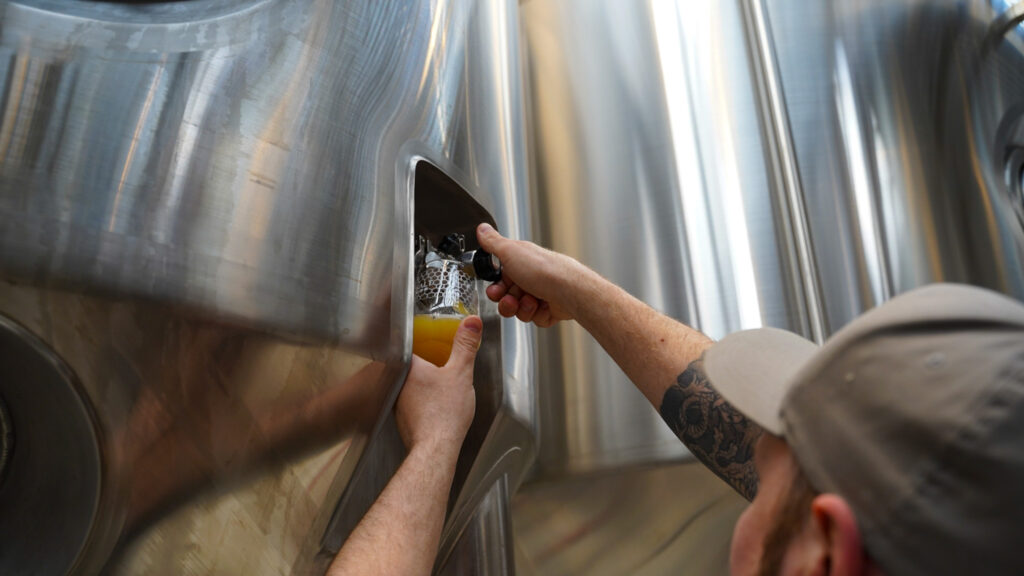
In addition to the wealth of well-received Pales and IPAs Salt has produced, they’ve also put out a number of stronger, punchier beers, too.
And with the brewery’s Hexagon Project, launched at the end of 2020, Stronge and his team are producing a diverse range beers – from the hop-forward to the dark and decadent.
It’s a series of small-batch, untethered and diverse beers allows us to experiment with non-traditional brewing methods & ingredients to create layers of flavour, texture, body & mouthfeel.
“The Hexagon Project was something we proposed last year, almost as a standpoint to the perception that we only make beer for supermarkets,” he explains. “We wanted a series of beers that smaller, independent businesses might like to stock. And beers that enable us as brewers to express ourselves in different ways.”
And while the Hexagon Project launched with Barrel-aged Baltic Porters and Barleywines, it’s not all about high ABV releases.
“Those initial four releases were slightly bigger, boozier, double figure ABV beers, but following that we launched a 4.4% session IPA, which is a take on our Citra IPA using some different hop products such as Citra Spectrum (a oil rich hop extract) from Baarth Haas.”
For Stronge, it was important that this strand of Salt’s output was anything verging on the predictable. But regardless of style, he places quality and stability needs to be front and centre of any beer the brewery puts out.
“There’s also an absolute raft of chancers that’ll throw anything into a beer and release it without it being safe.”
He muses: “It’s a very pertinent issue. I do believe that there is nowhere near enough QC across the craft beer industry. There are certain breweries who do it immaculately well and will never release a beer until they’re 100% happy. You can buy that beer knowing it’s going to be perfect every time.
“Those breweries should be lauded and praised. But there’s also an absolute raft of chancers, that’ll throw anything into a beer and release it without it being safe.
“Not only will it get out there and even beyond having to be like product recalled, it could explode and injure someone, all while still getting high ratings online!
“I would be absolutely ashen-faced and totally ashamed if one of my beers got released in that shape. But there seems to be an appetite for extreme beers, even those that are packaged poorly.
“People will have the can explode then pop online to review it: ‘Yeah, man. Nearly blew my hand off five stars!!’.”
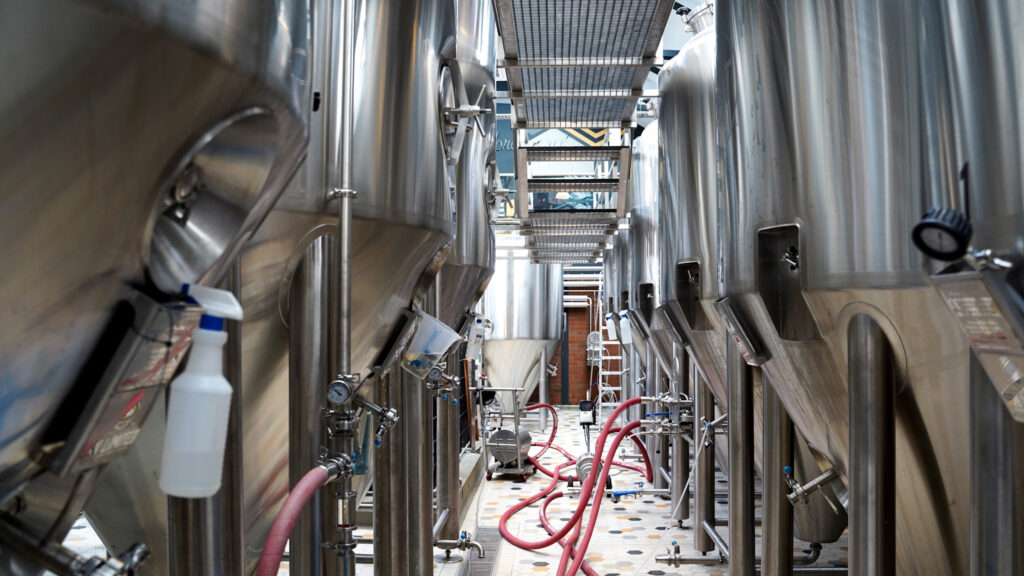
During his brewing career, Stronge has helped create, refine and collaborate on a wealth of regarded and revered beers. One release he’s asked about time and time again is Yellow Belly, a collaboration he carried out with Omnipollo during his time at Buxton Brewery.
And just like a musician producing a hit song, he’s got used to speaking at this legendary brew. An 11% Peanut Butter and Biscuit Imperial Stout. Except one with no peanuts or biscuits in it.
“I have brewers come to me asking about that beer and think ‘Jesus that was years ago, give me a break!” he laughs. “But it was a fantastic beer, that I still love to this day and it did a lot for my career, too.”
The beer came about as a result of Buxton Brewery’s participation in The Rainbow Project challenge, an initiative created by Siren Craft Brew which brings together 14 breweries to make seven collaborative beers themed on the colours of the rainbow.
In 2014, Buxton drew ‘Yellow’ out of the hat and were paired up with the Stockholm-based Omnipollo. However, the initial collaboration was going to be a beer that sits at the opposite of the style spectrum to the beer they would eventually release.
“The original release of beer was one that later got released as Stolen Fruit. A sour wheat beer brewed with juice and zest from three varieties of grapefruit and key lime,” he recalls. “We figured everyone was going to be releasing big stouts so thought we’d go in the other direction and take people by surprise.”
However, they’d soon find themselves going in a different direction and Henok Fentie, the co-founder of Omnipollo, was in town to help on a brewday.
“We went to Morrisons to stock up on extra grapefruit and lime. We cleared the shelves and even asked the staff if they had anything else left around the back,” he smiles. “If we were going to do it, we were going to do it properly.”
Stronge adds: “We ended up back at the brewery zesting and juicing the fruit alongside my assistant at the time, Jake.
“But during the day we started talking about different beer styles and floated the idea of doing a beer that tasted as if it had been barrel-aged when, in fact, it had never seen a barrel.
“Henok discussed conversations he had been having with the University of Stockholm on some flavouring concepts, and it built from there.”
A dialogue would continue before settling on a beer they knew they had to make. A peanut and biscuit stout that was allergen-free and featured no peanut nor biscuit. Stronge devised the grist bill while Fentie worked on the flavouring side of the equation.
Then came the question of branding.
“I distinctly remember attending the Mikkeller Beer Celebration, or the Copenhagen Beer Celebration as it was at the time. Henok told me that Karl (Grandin, Omnipollo co-founder) had an idea and took me to their stand.
“And there was Karl sketching the bottle with this KKK thing on it and I was like:
‘Oh my God, what?!’”
The basis of the branding was the idea expressed by the colour yellow is cowardice. The challenge was to transpose this idea, and the breweries’ sentiments around it, into a beer.
The political situation throughout Europe was in turmoil at the time with the presence of groups such as the National Front, Sverigedemokraterna, British National Party, EDL and Dank Folkeparti.
Speaking to Buxton Brewery, Fentie said: “One thing that struck us while the preliminary political polls were being presented during election night was that the actual support for the Swedish fascist party was in reality 40% higher than what people had disclosed when asked (face to face) what they voted for just after casting their ballot.
“At the same time the polls were more or less accurate when it came to other parties on the political scale.”
In essence, although people vote extreme right they are on average not as prone to admitting to it as people voting for other parties are.
The conversation would soon shift to the existence of the Ku Klux Klan, the supremacist terrorist group that would spread hate under the cover of disguise.
“It wasn’t 100% an easy decision, says Stronge. “Some of the guys at Buxton did not want to release that label at all, and there was a lot of discussion about regarding what we were going to do with it. The original design didn’t have Yellow Belly written on the label either. Instead it was just going to be in the white bottle with a hood.
“And there was no way Buxton were going to allow it to be released in that state. So the compromise was, we’d have Yellow Belly written on the front of the wrapping. I genuinely thought we were going to get loads of hate mail from the US. But as far as I know, we never did. Or maybe they just kept that from me!”

Yellow Belly isn’t the only excellent collaboration in Stronge’s repertoire. Another beer he produced during his time at Buxton Brewery was Deep Rainbow Valley, a collaboration with Arizona Wilderness. And it’s one that’s close to his heart.
The beer was a soured saison which was infused with orange juice, wild foraged gorse flowers and Amarillo hops before being bottled, corked and caged by hand with Brettanomyces yeast.
It poured a clean orange colour with a large foamy head. Strong yeast and wine esters in the aroma with tangerine, orange and tart citric notes. The flavour is somewhat tart with notes of grapefruit, lemon, white wine and apricots.
“It was one of the first times we tried to something really big with Brett and it just worked really well.”
“It’s probably my favourite beer that I’ve made. It was one of the first times we tried to something really big with Brett and it just worked really well,” he says.
“It just happened that my friend Jay Krause, now of Cloudwater, had recently brewed a 100% Brett-fermented IPA. He invited us over to crop off that and it all worked out really nicely!”
Some six years on from the launch of that beer, Stronge has continued to make a mark in the wonderful world of brewing where he’s made his career.
“Of course I have my moments. Sometimes you look at what’s going on in the industry and ask what on earth is going on,” he laughs.
“But I’ve learned to try and ignore things like infected or badly-packaged beers that perform so well with online rating sites and the like. Instead, I focus on what I enjoy drinking and what I love brewing.
“And that means things like great lagers and West Coast IPAs. But regardless of the style, it’s about making beers that are as perfect as they can be. Unsurprisingly I’m not in any way opposed to big flavours in beers. I love challenging what flavours are and how they can present themselves in beer.
“But at the same time, I want to make sure that I’m not going to take anyone’s thumb off while I’m doing it!”


